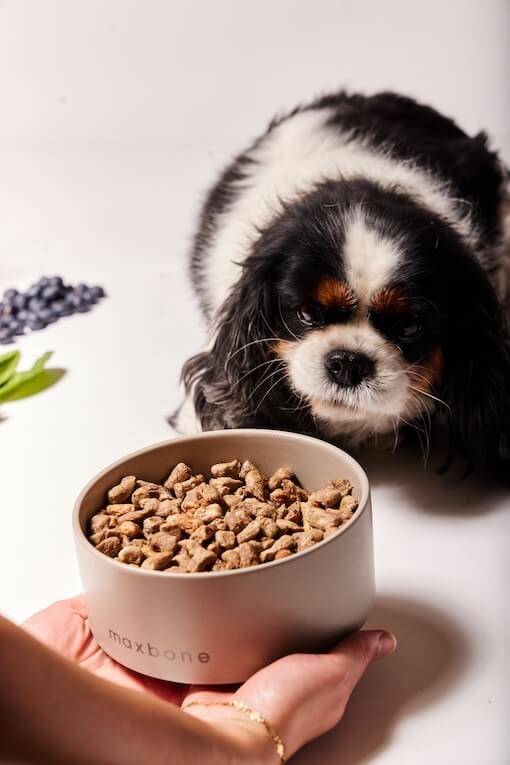
DogFoodAdvisor is reader supported See how
Dog Food Advisor is 100% impartial and is never paid to promote any brand. But if you buy using links on this page, we may earn a referral fee.
Probiotics are having their moment in the spotlight. In the past five years, searches on probiotics for dogs have increased by 94%. 1
But, what’s all the fuss about?
Probiotics, often referred to as “good bacteria,” have been praised for their countless benefits in human health. But did you know these tiny microorganisms can work wonders for your four-legged family member too?
Just like humans, dogs have their own unique microbiome. The combination of bacteria in their microbiome is essential to their overall health and for those with sensitive stomachs.
But what exactly are they and what are the best probiotics for dogs?
What are Probiotics for Dogs?
Probiotics are bacteria, but don’t worry, they’re friendly!
The term “probiotics” refers to beneficial gut-dwelling microbes (bacteria and yeast). Like humans, dogs have billions of these microorganisms in their stomachs, helping them fight infections, digest food, and strengthen their immune systems.
This community of microorganisms is called the microbiome and a healthy dog needs a healthy microbiome.
A balanced combination of bacteria in a pet’s microbiome is essential for their overall well-being. Imbalances in the oral and gut microbiome can lead to health concerns, including diarrhea, diabetes, gum disease, or skin issues. 2
Are Probiotics Good for Dogs?
Can I feed my healthy dog probiotics?
“Probiotics are a powerful addition to any dog’s diet,” says Laura Ward, DFA’s nutritionist.
“The research into the microbiome and how gut health links to seemingly every other area of health shows us how important it is to maintain a healthy microbiome for our dogs.
“Probiotics provide benefits from easing anxiety and allergies to improving digestive health and boosting immune capabilities. They are a useful option to have for healthy dogs and those needing additional support.”
Benefits of probiotics for dogs
Probiotics promote digestive health by maintaining a harmonious balance of gut bacteria. As mentioned, they are a popular solution for diarrhea and general gastrointestinal upset.
But, they have also been found to counter urinary infections, boost the immune system, improve skin and coat, and help with allergies.
One of the more recent discoveries is how they support mental health. Your dog’s gastrointestinal system and brain are in constant communication, and appropriate microorganisms in the intestines can help with mental and emotional regulation.
Studies have demonstrated that dogs taking certain probiotics are more inclined to explore new environments and less prone to barking, jumping, or spinning in situations that typically cause distress. 3
Best Probiotics For Dogs
There are many reputable probiotic supplements available on the market which come in different forms:
Dog food
Opting for dog food with added probiotics may simplify your life and benefit your dog. Ensure the food also includes prebiotics to nourish the bacteria. Keep in mind that product quality and probiotic effectiveness can be influenced by factors such as production methods and the type of food.
Some 5-star rated foods which contain probiotics include:
Treats
Soft treats with probiotics offer a convenient way to supplement your dog’s diet. However, some treats may contain additives and preservatives which you should watch out for.
Pills
Probiotic capsules are also available. Often this can be the best, most concentrated option, but ensuring your dog actually eats the pill can be tricky for some.
Powders
Powdered probiotics, particularly those in individual packets can be a good option as the air and moisture are controlled. However, powdered products can also be a struggle to give your dog and they might not consume the entire pouch.
Take time to research and buy from a pet food company that tests the quality of their products. Labels should include an expiration date, the exact species, the number of microorganisms in the product, and a guarantee for the number of live organisms.
Natural Probiotics For Dogs
Human foods such as yogurt, kefir, and fermented vegetables have live cultures that may benefit some dogs.
Homemade Probiotics for Dogs
If you want to make a probiotic treat at home, there are some recipes you can research online – most of which are yogurt-based. It’s safe to feed your dog plain yogurt and kefir but ensure they don’t include artificial sweeteners or flavors such as xylitol which can harm your dog. It’s also best to limit these quantities of probiotic foods for dogs, for example:
1 teaspoon per day for small dogs
2 teaspoons per day for medium-sized dogs
3 teaspoons per day for large dogs or giant-breed dogs
“Yoghurt and kefir are great, and a nice addition to a dog’s diet,” says Laura. “But providing probiotics through a supplement is a more concentrated source, and there is more control of the quantities to give particular effects.”
If in doubt, opt for pet-specific products as opposed to human food, just to be on the safe side.
Do All Dogs Need Probiotics?
A generally healthy dog should be able to maintain the balance of digestive microbes naturally. Should your dog’s microbiome change, they might show signs of illness in various ways, including:
- Diarrhea
- Bloating
- Weight loss or gain
- Gas
- Cramping
- Upset stomach
- Bad breath
- General poor health
- Allergies
What causes changes in the microbiome and can it be prevented?
These changes can be triggered by various factors such as dietary alterations, antibiotic use, weaning, consumption of spoiled food, or experiencing stress.
It can be difficult to predict when your dog will undergo a microbiome change. However, if you anticipate situations such as moving house or dietary changes that could affect your dog, supplementing them with a probiotic could be extremely beneficial.
Final word
The Dog Food Advisor does not accept money, gifts, samples or other incentives in exchange for special consideration in preparing our reviews.
However, we do receive a referral fee from online retailers (like Chewy or Amazon) and from sellers of perishable pet food when readers click over to their websites from ours. This helps cover the cost of operation of our free blog. Thanks for your support.
For more information, please visit our Disclaimer and Disclosure page.
Sources
Article reviewed by
Laura Ward
Pet Nutritionist
Laura studied BSc (Hons) Animal Science with an accreditation in Nutrition at the University of Nottingham, before working for eight years in the pet food and nutrition industry.





